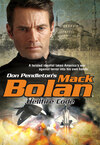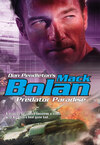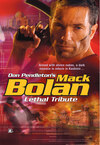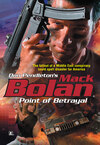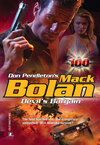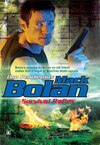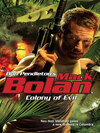Loe raamatut: «Hellfire Code»
For nearly a minute neither man spoke
“Whatever’s going on between you two is none of my concern,” Bolan growled. “Will you help me or not?”
Subaharam nodded and Neshbi began to speak. “I do not know who might want to rekindle the hatred between my people and the government. But we are certain it was started by an outside influence.”
“Any idea who that influence might be?” Bolan asked.
“At first I thought it might be your CIA,” Neshbi replied. “Now I am uncertain who is behind it, but I think they are trying to threaten the alliance.”
“What alliance?” Bolan queried.
“You did not know? The MEK has formed an accord with the Armed Islamic Group.”
“For what purpose?” Subaharam demanded.
“What else? The utter destruction of the West.”
Other titles available in this series:
Omega Game
Shock Tactic
Showdown
Precision Kill
Jungle Law
Dead Center
Tooth and Claw
Thermal Strike
Day of the Vulture
Flames of Wrath
High Aggression
Code of Bushido
Terror Spin
Judgment in Stone
Rage for Justice
Rebels and Hostiles
Ultimate Game
Blood Feud
Renegade Force
Retribution
Initiation
Cloud of Death
Termination Point
Hellfire Strike
Code of Conflict
Vengeance
Executive Action
Killsport
Conflagration
Storm Front
War Season
Evil Alliance
Scorched Earth
Deception
Destiny’s Hour
Power of the Lance
A Dying Evil
Deep Treachery
War Load
Sworn Enemies
Dark Truth
Breakaway
Blood and Sand
Caged
Sleepers
Strike and Retrieve
Age of War
Line of Control
Breached
Retaliation
Pressure Point
Silent Running
Stolen Arrows
Zero Option
Predator Paradise
Circle of Deception
Devil’s Bargain
False Front
Lethal Tribute
Season of Slaughter
Point of Betrayal
Ballistic Force
Renegade
Survival Reflex
Path to War
Blood Dynasty
Ultimate Stakes
State of Evil
Force Lines
Contagion Option
Hellfire Code
Mack Bolan®
Don Pendleton

Goodness without wisdom always accomplishes evil.
—Robert Anson Heinlein
I have no fight with others who walk a like path to mine. But they make my cause inhumane and despicable when they kill without cause. I will hold them responsible for that.
—Mack Bolan
CONTENTS
PROLOGUE
CHAPTER ONE
CHAPTER TWO
CHAPTER THREE
CHAPTER FOUR
CHAPTER FIVE
CHAPTER SIX
CHAPTER SEVEN
CHAPTER EIGHT
CHAPTER NINE
CHAPTER TEN
CHAPTER ELEVEN
CHAPTER TWELVE
CHAPTER THIRTEEN
CHAPTER FOURTEEN
CHAPTER FIFTEEN
CHAPTER SIXTEEN
CHAPTER SEVENTEEN
CHAPTER EIGHTEEN
CHAPTER NINETEEN
CHAPTER TWENTY
CHAPTER TWENTY-ONE
CHAPTER TWENTY-TWO
CHAPTER TWENTY-THREE
CHAPTER TWENTY-FOUR
CHAPTER TWENTY-FIVE
CHAPTER TWENTY-SIX
CHAPTER TWENTY-SEVEN
PROLOGUE
A torrential downpour had slammed into the six men for the past hour, soaking them to the bone, not to mention reducing visibility to such a point they could hardly make out their target.
Alek Stezhnya had spent the better part of his career in the worst hellholes the world had to offer, but those spots had yet to beat May in Atlanta, Georgia. He wiggled his toes. The pressure squished water into the spaces between his wool socks and leather combat boots. Okay, so his employer paid him enough to stand here drenched, but that still didn’t excuse this sorry mess. The sooner he could get out of here and back to the comfort of shelter and warm, dry clothes the better his temperament.
Stezhnya lowered the infrared night-vision device, flipped a switch to kill the power and then handed it to his aide for storage. Fortunately, that particular make of NVD was waterproof. Not that it mattered, since the rain washing across the lenses smeared any hope of a clear image. Stezhnya made a conscious effort not to let it bother him. Instead, he checked his watch.
They could still do this thing by the numbers.
Stezhnya held up two fingers, and the signal was passed along the line of men spread across the rooftop every ten meters. Their target, a three-story apartment complex in one of Atlanta’s seedier neighborhoods, stood directly across from them. According to Stezhnya’s intelligence, the New Corsican Front, a French Islamic terrorist group operating an underground smuggling operation inside the U.S., kept their human cargo in twin apartments on the top floor. And Stezhnya knew he could trust that intelligence since it had come from the former deputy director of the NSA, Garrett Downing.
Stezhnya lost his position with an elite commando unit in the Russian army following the dissolution of the USSR. He immigrated to the U.S. with relative ease, since his American mother returned a few years prior after her husband succumbed to alcoholism. Downing’s connections inside the NSA led him to Stezhnya. When Downing offered him the chance to head up a new elite antiterrorist unit known as the Apparatus, Stezhnya immediately accepted. After many months of training and preparation, the Apparatus had its first assignment.
“Take them down,” Downing had ordered. “All of them. Understood?”
Stezhnya understood perfectly. He owed the terrorists payback for the lives of a few men with whom he’d served in Russia, not to mention for the loss of his home. Now a mere fragment of what had once been a glorious nation, the Soviet Union owed some of its demise to terrorism. The KGB had fought nearly every known terrorist organization over the past two decades. Only corruption, misery and death resulted, and now someone had to pay. Terrorist groups like the New Corsican Front seemed the logical choice.
Stezhnya gave the signal as soon as the two minutes elapsed.
One of the men stepped forward and raised a crossbow to his shoulder. He sighted through an IR scope that ran the length of the weapon, then squeezed the trigger. The lightweight grappling hook attached to the crossbow bolt sailed across the opening between his position and the opposing roof. The man waited for a few moments, then yanked up and back on the crossbow at a critical moment. The sudden change in direction caused the rope to loop around a thick, steel ventilation pipe emerging from the rooftop. Eventually it became entangled in the grappling hook. The bowman quickly tied off to a roof stanchion on their end and then nodded “all-clear” to Stezhnya.
Stezhnya pointed at his aide, Lyle Prichard, and a man named Barry Galeton. He gestured for them to begin the perilous journey across the rope to the apartments. They were young, not as experienced as some of the other men in the Apparatus, but Stezhnya couldn’t afford to be selective right now. If the trip proved too treacherous, it was better to lose those with less talent than to risk the veterans.
Prichard seemed intense, focused. The lanky black man swung his legs into position and proceeded across the rope with undaunted enthusiasm. Stezhnya had first met him when Prichard worked as a cop in L.A.
Every man in the Apparatus had been hand-picked by Downing because their profiles matched the kind of men he sought: young, idealistic, impressionable. These were the key traits of revolutionaries. Downing trusted Stezhnya to lead them to victory, and there was no way he’d betray that trust. The Russian knew he would persevere even if it meant his life. They had to succeed simply because they couldn’t afford not to. America was under siege, and it was up to the Apparatus to do something about it. Downing would have enough trouble gaining support for his cause, and Stezhnya wanted to make sure the Apparatus was part of the solution, not the problem.
Galeton waited until Prichard was about halfway across before following him. The rope was a twisted-fiber blend with a polymer sheath, rated to one thousand pounds. It would easily have held twice the weight presently testing it.
Once both men were safely across, Stezhnya went next. He crossed the gap with the speed and efficiency of a practiced expert. The pair on point had a perimeter established by the time Stezhnya reached them.
Stezhnya ordered Galeton to take point. They had left one man behind to cover their exit. Once they completed the operation, there wouldn’t be time to go back the same way they’d come. That meant a more conventional means of exiting the target area to facilitate rapid extraction, which in this case happened to be the back door. The getaway driver sat waiting in a panel van parked on the next block.
It took less than two minutes for their Italian demo expert, Mick Tufino, to burn through the rooftop door lock with a high-temperature minitorch. The group descended the stairs, now producing the weapons they had stowed in waterproof bags. The old stairwell stunk faintly of urine mixed with industrial cleaners. It was pungent combined with the odors of sweaty men in wet clothes.
They traversed the steps from the rooftop door to the third-floor landing without a sound. Galeton reached the door, waited for Stezhnya’s approval to open it and then stepped into the hallway. He tracked both sides with the muzzle of his weapon, a Spectre M-4, and then indicated the rest of the group could follow. At this point, they would split into two teams. Stezhnya would accompany Prichard to one apartment, Galeton and Tufino to the other. The last man on the team, a former Somali peacekeeper named Kofi Jamo, would provide rear guard action if required, and ensure no stragglers escaped. Of course, the idea was to make sure the terrorists never left their apartments.
The two teams took out the flimsy apartment doors with well-placed kicks. Stezhnya tracked the room and quickly realized his eight targets ranged around a large table. The room smelled faintly of spices, a smell that wasn’t unfamiliar to Stezhnya. He’d fought and killed enough of this kind in the past to know their culinary preferences. That alone fueled the rage he felt as he and Prichard simultaneously triggered their weapons.
Their enemy never stood a chance.
The Spectre M-4s chattered their messages of death, spraying the hapless targets with 9 mm Parabellum bullets. The sound of autofire was thunderous inside the confines of the small apartment. Plaster dust and wood-chips were whipped into the stale air from rounds that went either wide and dug into walls, or ate into furniture. The Spectre M-4s were ingenious inventions, sporting special 50-round capacity magazines that looked like they held the typical thirty rounds. In less than fifteen seconds, Stezhnya and Prichard pumped one hundred rounds of high-velocity ammo into their targets.
They changed out magazines before the last body hit the ground. Blood and smoke commingled with the stench of spent gunpowder. Stezhnya whirled on his heel and headed for the hallway, Prichard in tow. They met with the others outside.
“It’s done?” Stezhnya asked Galeton and Tufino.
The pair nodded and Stezhnya grunted with satisfaction.
Jamo took point and started for the stairwell exit when noises attracted their attention. Stezhnya turned and noticed an old woman had entered the hallway from the apartment next to the one he and Prichard had stormed.
“What’s all this racket?” the woman demanded. Obviously she was hard of hearing.
Stezhnya turned and continued for the exit, instructing his men to follow and ignore her, but then they heard a shout. Several more of the terrorists emerged from the apartment and toted hardware of various makes.
The Apparatus reacted just as their repetitive training mandated. They fanned out, brought their weapons into play and opened up on the newcomers with sustained bursts. Stezhnya tried to warn them to utilize discretion, but at that range chances were abysmal the old woman wouldn’t be hit. Fate wasn’t on her side, and a moment later she toppled with the terrorists under the onslaught of automatic weapons fire.
“Damn!” Stezhnya barked at his men. “Damn it to hell, you just killed her for nothing! Now shag your asses! Move!”
There wouldn’t be a second chance, because now the hallway was filled with onlookers—some of them big and armed with an array of implements—and murderous intent raged in their faces. Stezhnya continued sounding retreat. Obviously some people in the crowd seemed determined that Stezhnya and his group were not leaving. After all, they had just gunned down a helpless old woman.
“You all brought your shit into the wrong place, whitey!” shouted one hulking black man with a baseball bat.
The man started toward them, and a few exchanged glances among the rest in the crowd was enough evidence for Stezhnya that they weren’t going to get out of this easily. The crowd rushed them and as Stezhnya backpedaled for the exit, he roared at his men to retreat. They tried, but the hallway proved too narrow for any type of orderly departure. Tufino and Jamo opted at the same moment to open fire with their weapons, probably more in the desire to drive back the crowd than to kill anyone. It didn’t have the desired effect, and even though the team rushed for the exit, they continued a covering barrage that proved lethal.
Stezhnya pushed through the exit door and descended the steps, the ghostly images of more bystanders falling on the firestorm of 9 mm stingers etched into his conscience. He could now hear the shouts of excitement mixed with fear from his men as they quickly followed. It was anything but a calculated retreat, but they managed to reach the back of the small apartment building without further incident and immediately made haste for the waiting van.
Stezhnya reached down and withdrew a tactical radio clipped to his belt. It took him a moment to notice it had stopped raining.
“Alpha One to Bravo Six.”
“Bravo Six, sir.”
“We’re out. Make for your rendezvous point.”
“Understood.”
Stezhnya replaced the radio and continued along the escape route, his men now in position around him. He couldn’t feel anything in his legs. In fact, he couldn’t feel much throughout his body. Stezhnya couldn’t say he was proud of everything he’d done in life, but he could affirm he’d never engaged in atrocities as a soldier. Tonight had been nothing short of murder. In all likelihood, Garrett Downing would be furious with him. One simple mission and they’d blown it all to shit. Without question, he’d impose some form of punishment. His men had committed an atrocity, but Stezhnya would be held responsible as their leader.
Yes, there would be hell to pay.
CHAPTER ONE
Mack Bolan breathed deeply, appreciating the fresh, mountain breeze that whistled through a stand of trees. He enjoyed the solitude but was ever watchful for some change in the current climate. He knew blacksuits were patrolling the grounds, perhaps even a couple observing him at that moment. But Bolan rarely let his guard down, no matter how safe the environment. Even here at Stony Man Farm.
Bolan’s week-long vacation to Stony Man Farm drew nearer the end, and it had proven his only safe haven. Just about anywhere else in the world he could think of would have been too dangerous. Bolan could hardly expect to enjoy some down time if he had to spend it looking over his shoulder, and the Blue Ridge Mountains of Virginia proved as good a rest spot as any. Sometimes Bolan took only the bare basics in a day pack and headed into the mountains for a couple of days. Those were times where he could reflect on the past, charge his mental batteries before rejoining his War Everlasting.
For the moment, though, Bolan would enjoy his R and R in Virginia. He knew it wouldn’t last much longer.
Recent intelligence revealed a group calling itself the New Corsican Front had established an underground for getting French-Islamic terrorists into the country. He didn’t have much to go on, but Bolan knew enough to believe the operation existed beyond speculation. Actually, he’d been waiting for additional intelligence, but his contact had missed their rendezvous in Atlanta. The Executioner wouldn’t typically have worried about something like that; it might not have meant anything. But the fact ex-NSA analyst Roger Neely hadn’t followed standard procedure bothered Bolan. It had never happened before, and he couldn’t think of any reason for it to change now.
A pager clipped to his belt signaled it was time for his meeting.
Bolan emerged from the trees and headed for the farmhouse. The Farm had gone through some renovations in the recent past, adding a new dimension to its layout. The addition—simply referred to as the Annex—boasted some of the most advanced electronic surveillance and counterintelligence equipment in the world. The modern subterranean facilities were camouflaged on the surface by a wood chipping mill. Call it pure nostalgia, but Bolan preferred the warm, charming surroundings of the old operations center secreted beneath the farmhouse to those of the modern, sanitary Annex. Meetings in the old War Room seemed cozier and somewhat less impersonal. Able Team and Phoenix Force espoused similar sentiments, so to keep the peace Brognola deferred to majority rule.
The Executioner entered the farmhouse and descended the stairs two at a time. He reached the basement and entered the War Room, expecting to find Brognola, Barbara Price and Aaron “The Bear” Kurtzman waiting. He wasn’t disappointed.
“Striker,” Brognola said. He got to his feet and shook Bolan’s hand. “It’s good to see you.”
“Likewise, Hal,” Bolan said. As they took their seats he added, “I assume you have something for me.”
“Indeed.” Brognola looked at Price.
Price nodded and then turned to Bolan. “At your request, we started a full inquiry into Roger Neely. You aren’t going to like what we found.”
“Is he dead?”
“No, he’s hiding. Or at least he thinks he is. He’s taken up residence in a small apartment in Manila with a native woman.”
Bolan’s eyebrows rose. “The Philippines? Well, if I didn’t have reason to be concerned before, I do now. That doesn’t sound at all like the man I know.”
“You would think a man with Neely’s training and experience could do better than that,” Brognola said. “Maybe he wants to be found.”
“Or he knows I can find him there and no one else can,” Bolan replied.
“We think we might know why he’s there,” Price continued. “It seems to have everything to do with the New Corsican Front. You said before he was working on getting some more intelligence for you?”
“Yeah,” Bolan replied. “Neely got word their underground was smuggling French-Islamists into the country. He was supposed to get back to me with something more solid but he blew the meet. That’s why I called you.”
“Well, that was the angle we worked from. There’s been a buzz in certain circles within the CIA and NSA. In fact, the American intelligence community suspects the NCF is actually a cover for this smuggling operation. You see, officially the NCF exists as a special interest to protest the treatment of French-Arab citizens and American involvement in Muslim countries. They get financial support from a number of sister organizations. They don’t deny their actions in saving victims from persecution, particularly if they can make it look as if America is behind its perpetration.”
“What you don’t hear in the papers is many of the people they’ve pipelined into America have a history of violence and known affiliations with terrorist groups,” Brognola added.
“Fine, so let’s assume Neely’s telling the truth. The million-dollar question is, why did he run?”
Price nodded at Kurtzman who dimmed the lights and projected a photograph on the screen. “That very distinguished-looking gentleman is Garrett Downing, age sixty-two, born in North Carolina. We think he’s the chief reason Neely’s hiding.”
Bolan did a double take at Price. “You’re talking about the Downing who’s former deputy director of the NSA?”
“The same.”
Bolan knew the name well, as did most anyone involved in covert operations for the U.S. government. Downing had spearheaded most of the projects dealing with electronic surveillance and countersurveillance following establishment of the Department of Homeland Security. His guidance and direction had tipped the scales to America’s advantage and put her well ahead of the game in technical sciences to achieve a superior intelligence community. His passion had saved countless lives, and significantly reduced not only the casualties of terrorist attacks in America but the chances of a repeat attack on American soil.
“How does Downing fit into this?” Bolan asked.
“Less than twelve hours ago, we received a report of a slaying of twenty persons in Atlanta,” Kurtzman said. “I wouldn’t have thought much more of it until our systems flagged it for probability scenarios on various algorithms I use to scan all data throughput.”
Bolan nodded. “Neely believed Atlanta was one of the major areas of operation for the NCF.”
“What Bear discovered is almost incomprehensible,” Brognola said. “Reports are still coming in, but I got wind as soon as it went down and we sent a team to investigate. It fell into the Justice Department’s jurisdiction when we discovered automatic weapons were used and thirteen of the victims were of French-Arab descent.”
“Looks like maybe someone beat you to the punch on this underground operation, Striker,” Price remarked.
Bolan nodded. “So how does Downing fit into this?”
“He’s taking credit,” Price said.
“Come again?”
“Downing claims the people who executed this operation were a special team of commandos operating under his orders. He also said this was the first official act of what he’s calling the Organization for Strategic Initiative.”
“Great,” Bolan said.
Brognola cleared his throat. “He issued a very heartfelt apology through all the major networks, as well as the press, for the families of the innocent people who died. He said while tragic, the losses were acceptable when we consider the costs of battling terrorists. He promised the next operation would be on a much larger scale, which signals there may be more, and I quote, ‘casualties of war’ before it’s over.”
“Sounds like a real lunatic,” Kurtzman remarked.
“Hardly,” Bolan replied.
“Mack’s right,” Price agreed. “Downing might sound fanatical but he’s not crazy. He views himself as a patriot.”
“An idealist,” Bolan added. “That makes him more dangerous.”
“Whatever his reasons, we obviously can’t let him continue,” Brognola said. “The President had suggested we use one of the teams to handle it, but I told him since you were here and already pursuing a lead we should ask for your intervention. He agreed.”
“Fine,” Bolan said with a nod. He looked at Price. “You mentioned Downing was the reason you thought Neely split the States. What’s the connection there?”
“Everything we have on Roger Neely says he’s a straight shooter all the way,” Price replied. “There’s no middle-of-the-road with this guy. His psychological profiles suggest he’s fiercely loyal, and his past performance reviews indicate he does everything strictly by the book. For a guy like that to suddenly give it all up and run tells us he’s afraid.”
“And with good reason,” Kurtzman interjected. “Barb, may I?”
Price inclined her head and Kurtzman keyed the projector to project a new photograph. “This man is Peter Hagen, fifty-nine years of age, born in Sarasota, Florida. He’s an MIT graduate who served as senior technology officer during Downing’s tenure at the NSA. He resigned the same year Downing did, but at the time he was working on a secret project to develop a comprehensive assault platform with Multi-Geo Transversal capabilities.
“MGT is a relatively new concept the U.S. military has only been inclined to pursue over the past six years or so. In essence, the concept is centered on small-scale assault mobility operations, like those conducted by elite military teams or antiterrorist units. Multi-Geo Transversal is actually the shorter version of Multiplied Geographical Transportation Universality.”
“Sounds like something out of a science-fiction novel,” Bolan said.
Kurtzman chuckled. “Simply put, MGT theory theorizes effective first-strike scenarios by small, specialized teams mobilized through some mechanism capable of traveling by sea, air or land.”
“A multiterrain vehicle, then,” Bolan said. “Is that all we’re talking about here?”
“MGT is a wee bit more than that. A core group of military scientists first toyed with this idea toward the end of the 1990s. The thought was that if they could create a transport with MGT abilities, it would allow them to cross-train smaller units more effectively. This, in turn, would reduce the cost of special operations, and by eliminating the coordination of multiple branches during insertion and extraction operations, secrecy stood severely reduced chances of compromise.”
“You see, we think Downing diverted enough funds from government surplus and project remainders to actually come up with a prototype,” Price said. “Peter Hagen was the brainchild of the operation at the time, but he’s now supposedly working in the civilian sector with a government contractor.”
“And guess where he’s currently residing?” Brognola asked.
“Atlanta,” Bolan said with a nod. “Okay, that’s enough evidence for me. What’s the plan?”
“We’re inserting you as a last minute add-on with the federal task force Justice sent to investigate the slayings down there,” Price said. “You’re cover will be Matt Cooper, a weapons specialist with the ATF. We have the full credentials ready.”
“You should have no trouble fitting in there,” Brognola added.
“Right,” Bolan agreed. “I’ll have to find some way of getting in touch with this Hagen. What do we know about him?”
Price handed him a personal digital assistant and smiled. “That contains all the information we have on Hagen and Downing.”
“It also has the ability to access our mainframe data systems through a cable network or wireless connection,” Kurtzman added. “You can even plug it into a phone line and get to us by dial-up.”
“Understand, the information on that device is encoded and will only unlock if you place your thumbs simultaneously on the back of it,” Price said. “If anyone other than you attempts to access the information or tampers with it in any way, the thing will instantly melt its circuits.”
“A little extra fail-safe we added at Hunt’s suggestion,” Kurtzman said with a grin.
Bolan could believe it. Some of the greatest minds on Earth comprised Kurtzman’s technical team. Huntington “Hunt” Wethers, the black former cybernetics professor from Berkeley with a near genius IQ; Carmen Delahunt, former FBI agent turned assistant extraordinaire; Akira Tokaido, a young computer hacker with an intellect as profound as his punk rock attire.
“I’ll find this Hagen,” Bolan assured them. “What has me more concerned, though, is Neely. I’ve known Roger quite a number of years now, and he’s always been dependable. Something must have really scared him that he would run.”
“We believe it’s possible Downing found out about Neely’s involvement from a mole inside the NSA,” Brognola replied. “It’s proving it that might be a bit more painful.”
“We’ll keep an eye on Neely,” Price said. “I promise if anything happens we’ll let you know right away.”
“I just don’t want things to go sideways before I can get to him, Barb,” the Executioner said. “I’m sure this is his way of calling for help.”
Price nodded, and Bolan could see from her expression that she empathized with his concerns. Since he had severed official ties with his government, Stony Man had never interfered with his right to pursue private missions. If anything they had supported him more times than he could recall. He’d tried to return the favor whenever possible. Sure, he could have walked away right now from this thing and chosen to go after Neely instead, but he knew that wouldn’t do any good.
Bolan believed Neely was on the run because of Downing. The only way he could clear Neely’s name was to get the heart of the issue as soon as possible. Barb and Hal were right. This mission had to start at the source, and the soldier knew if he could get to the source of Downing’s operation he could get to Downing. By removing the threat posed by Downing’s OSI group and whatever project this Hagen was working on, the threat to Neely would probably go away, as well.
“We’ve arranged for a commercial flight out of Dulles,” Brognola said. “Tonight. I wish we could have sent Jack with you, but he’s currently on assignment in Turkey with Phoenix Force.”
“Cowboy’s arranged to have all your special friends waiting for you in Atlanta,” Price said with a knowing wink.
That was good news. John “Cowboy” Kissinger was Stony Man’s chief armorer and a first-rate operative. Cowboy had a unique talent for assessing the needs of the Stony Man crew before they even knew what they needed. Rarely did a weapon jam or fail when serviced under Kissinger’s practiced eye and meticulous craftsmanship.
So Garrett Downing was calling out the terrorists. Unfortunately, he’d chosen to ignore the rules of the game and he’d called out the Executioner, as well. Even in war the purposeful taking of innocent lives was unacceptable. Bolan knew that creed well, and he’d lived by it. It had earned him the respect of his comrades and the moniker of Sergeant Mercy. The Executioner would have to teach Garrett Downing this lesson the hard way.
Tasuta katkend on lõppenud.
